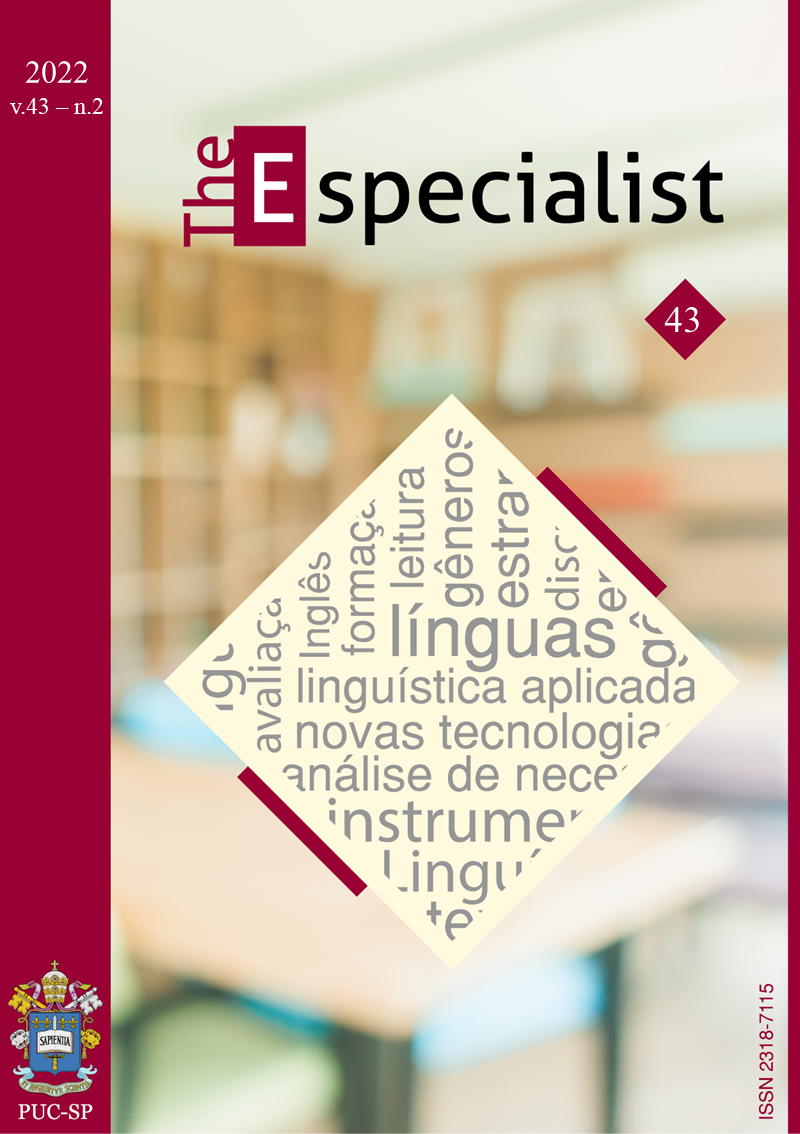Saell - a tool to support Libras Studies as a L2 and a learning object for learners and teachers
DOI:
https://doi.org/10.23925/2318-7115.2022v43i2a9Keywords:
Libras, L2, Objeto de aprendizagem, SaellAbstract
Digital media stimulate communication and can contribute to the studies of Brazilian Sign Language (Libras) as a second language (L2) for hearing people. This bibliographical work is situated in this context and aims to present the Support System for the Studies of Libras as L2 (Saell) and demonstrate that this site is characterized as a learning object. Therefore, it describes its structure and functioning and proves that it presents granularity, reusability, interoperability, recoverability, interactivity, and autonomy (Gama, 2007; Lebedeff, 2017; Leffa, 2006). Conclusively, it considers that Saell meets the current technological trend in language education; that, through its organization, facilitates the collaboration and sharing of relevant linguistic and pedagogical content; and that, in an original way, initiates contributions to the repositories of didactic and instructional materials in video for learners and teachers who work with Libras as L2.
References
AUTONOMIA. 2022. In: MICHAELIS. Disponível em: https://michaelis.uol.com.br/busca?id=EMnj. Acesso em: 22 fev. 2022.
BRAGA, J. (Org.), 2014, Objetos de aprendizagem: introdução e fundamentos. Santo André: UFABC. Disponível em: https://pesquisa.ufabc.edu.br/intera/wp-content/uploads/2015/12/objetos-de-aprendizagem-v1.pdf. Acesso em: 22 fev. 2022.
CORREIA, L.G.; PINHEIRO, B. 2012. E-learning: perspectiva histórica de um processo em curso. História: Revista da FLUP, 4.2: 195-216. Porto. Disponível em: https://ler.letras.up.pt/uploads/ficheiros/11324.pdf. Acesso em: 22 fev. 2022.
GAMA, C.L.G. 2007. O método de construção de objetos de aprendizagem com aplicação em métodos numéricos. Tese de Doutorado. Programa de Pós-Graduação em Métodos Numéricos em Engenharia, Universidade Federal do Paraná. Disponível em: http://paginapessoal.utfpr.edu.br/kalinke/grupos-de-pesquisa/grupos-de-pesquisa/pdf/carmem%20lucia.pdf. Acesso em: 22 fev. 2022.
INTEROPERABILIDADE. 2022. In: DICIONÁRIO on-line de português. Disponível em: https://www.dicio.com.br/interoperabilidade/. Acesso em: 22 fev. 2021.
LEBEDEFF, T.B.; SANTOS. A.N. 2014. Objetos de aprendizagem para o ensino de línguas: vídeos de curta-metragem e o ensino de Libras. Revista Brasileira de Linguística Aplicada, 14.4: 1073-1094. Belo Horizonte. Disponível em: https://www.scielo.br/scielo.php?pid=S1984-63982014000400013&script=sci_abstract&tlng=pt. Acesso em: 22 fev. 2022.
LEBEDEFF, T.B. 2017. Vídeos como objetos de aprendizagem para o ensino de línguas: uma discussão na perspectiva de aprendiz de língua de sinais britânica. Veredas On-line, 1: 129-143. Juiz de Fora. Disponível em: https://periodicos.ufjf.br/index.php/veredas/article/view/27984/19081. Acesso em: 22 fev. 2022.
LEFFA, V.J. 2006. Nem tudo o que balança cai: objetos de aprendizagem no ensino de línguas. Polifonia, 12.2: 15-45. Cuiabá. Disponível em: http://www.periodicoscientificos.ufmt.br/ojs/index.php/polifonia/article/view/1069/841. Acesso em: 22 fev. 2022.
MCGREAL, R. 2004. Learning objects: a practical definition. Athabasca University. Disponível em: https://auspace.athabascau.ca/handle/2149/227. Acesso em: 22 fev. 2022.
OLIVEIRA, L.R. et al. (Orgs.), 2016, Dicionário de terminologia EAD. Barbacena: UEMG. Disponível em: https://editora.uemg.br/images/livros-pdf/catalogo-2016/2016_DICIONARIO_DE_TERMINOLOGIA_EAD.pdf. Acesso em: 22 fev. 2022.
PINHO, M.S. 2014. A percepção de jovens da geração digital quanto ao suporte ao trabalho oferecido pela organização. Tese de Doutorado, Universidade Nove de Julho. Disponível em: https://bibliotecatede.uninove.br/bitstream/tede/1596/2/Magda%20Sales%20Pinho.pdf. Acesso em: 22 fev. 2022.
PRETI, O. 2000. Autonomia do aprendiz na educação a distância. In: O. PRETI (Org.), 2000, Educação a distância: construindo significados. Cuiabá: NEAD/IE- UFMT; Brasília: Plano.
RAMOS, A.F.; SANTOS, P.K. dos. 2006. A contribuição do design instrucional e das dimensões da educação para o desenvolvimento de objetos de aprendizagem. In: CONGRESSO DA SOCIEDADE BRASILEIRA DE COMPUTAÇÃO, 26., 2006, Campo Grande. Anais […]. Campo Grande: WIE. Disponível em: http://ojs.sector3.com.br/index.php/wie/article/view/876. Acesso em: 22 fev. 2022.
SISTEMA DE APOIO AOS ESTUDOS DA LIBRAS COMO L2 – SAELL. 2018. Disponível em: http://www.saell.ufpr.br/. Acesso em: 22 fev. 2022.
SILVA, L.; SOUZA, S.A.V. 2021. Práticas extensionistas relacionadas à libras como L2 para ouvintes: relato e avaliação da experiência. Extensio: Revista Eletrônica de Extensão, 18.40: 140-155. Disponível em: https://periodicos.ufsc.br/index.php/extensio/article/view/82097/48113. Acesso em: 22 fev. 2022.
WELLINGS, J.; LEVINE, M.H. 2009. The digital promise: transforming learning with innovative uses of technology. Nova York: Joan Ganz Cooney Center at Sesame. Disponível em: https://www.intel.com/content/dam/doc/white-paper/education-the-digital-promise-transforming-learning-with-innovative-uses-of-technology-paper.pdf. Acesso em: 22 fev. 2022.
Downloads
Published
How to Cite
Issue
Section
License
Copyright (c) 2022 The ESPecialist

This work is licensed under a Creative Commons Attribution 4.0 International License.
The authors grant the journal all copyrights relating to the published works. The concepts issued in signed articles are the absolute and exclusive responsibility of their authors.


 Esta obra está licenciada com uma Licença
Esta obra está licenciada com uma Licença 